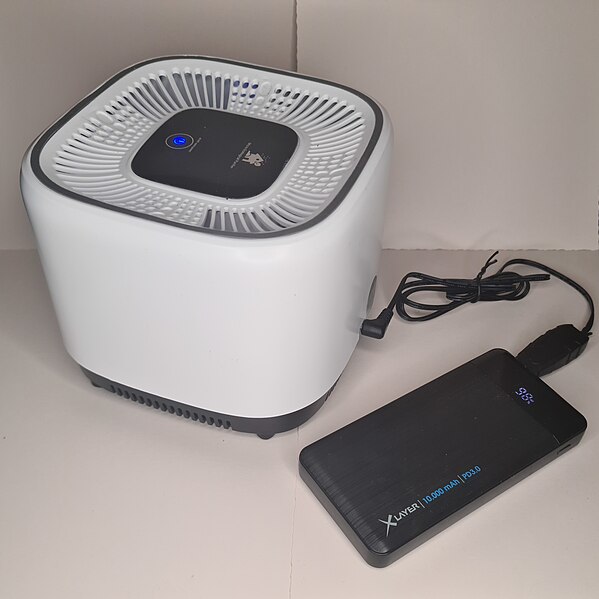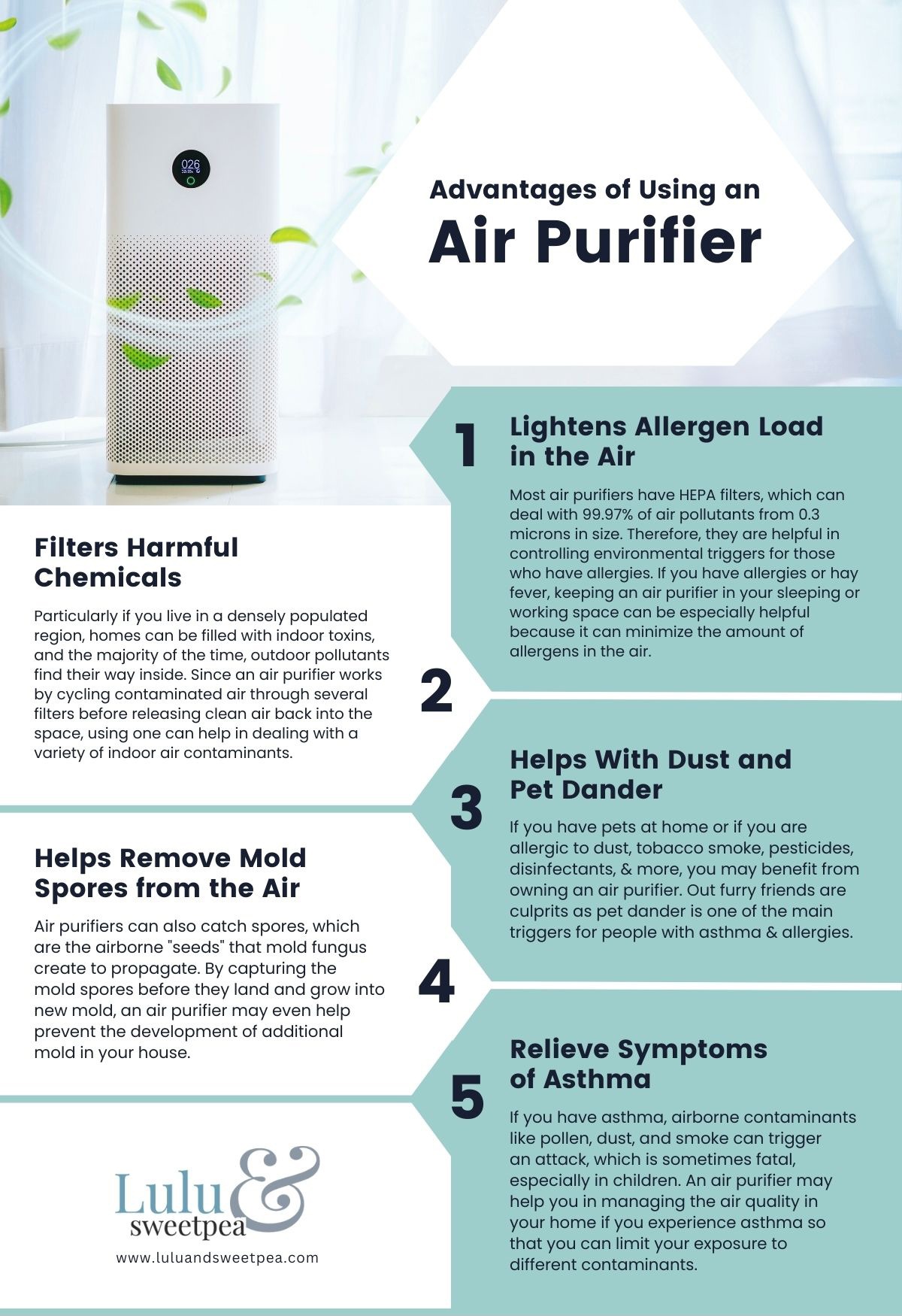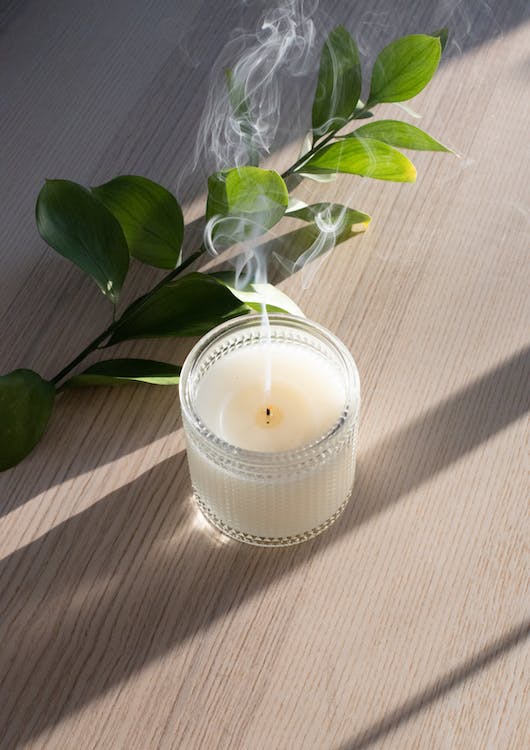What are Air Purifiers?
Air Purifiers are devices built to purify indoor air by filtering and eliminating pollutants, allergens, and contaminants. These devices use various techniques and filters like HEPA filters, activated carbon filters, and UV-C light for the purification process.
They offer generous health benefits as they filter many pollutants from the air which might lead to respiratory problems. They remove airborne particles like tobacco smoke, dust, pollen, etc., which can pose a risk to people with asthma or allergies.
Some purifiers use ultraviolet light to kill bacteria and viruses which makes it possible to kill even the smallest microorganisms that can be harmful.
The Link between Air Quality and Stress
Air Purifiers have almost become a necessity of every household because of the decline in overall air quality. Studies have shown that there is a direct link between stress levels and the quality of air.
A study published in the journal Environmental Health Perspectives in 2018 denoted that a mere increase of 5 micrograms of particulate matter (PM 2.5) can jump the risk of anxiety disorders to a dangerous 12%.
Poor air quality can also affect mood indirectly. For example, it can greatly discourage people from engaging in outdoor activity and exercise. This can lead to the person feeling unhealthy physically as well as mentally. They might feel trapped indoors which might lead to further frustration.
In this blog, we are going to explore the detrimental health impact if the air we breathe in our homes and offices is not clean. We will also discuss how air purifiers can remedy that and assist in alleviating stress and improving mental well-being.
This blog will teach you what to look for in an air purifier when buying one. We will also share a few tips and tricks about how to keep the air clean and subsequently reduce stress. So, without wasting any more words, let’s dig in
The Effects of Poor Air Quality on Stress
Poor AIr Quality causes Stress
Poor air quality adversely affects mental health and causes stress.
When air pollutants invade our respiratory columns, they trigger an avalanche of reactions in the body in an attempt to fend them off. The body releases reactive oxygen species (ROS) which damage cells and tissues and cause inflammation.
If the ROS is released in excess it can cause oxidative stress. Both oxidative stress and inflammation have a direct link with increasing stress by increasing anxiety and depression.
Moreover, it has been observed that contaminated air can meddle with the levels of neurotransmitters like serotonin and dopamine. These neurotransmitters are directly linked with mood regulation and thus are directly linked with mental well-being.
Some Research Studies to make our case
Numerous studies validate the idea that poor air leads to stress.
For example, an investigation published in the JAMA Psychiatry journal[1] declared people exposed to poor air contaminated with pollutants like nitrogen oxides and nitrogen dioxides faced an increased risk of anxiety and depression later in their life as adults.
Children, too, have it the worst. Another study published in the BMJ Open Journal[2] depicted that children were at a higher risk of developing mental problems even at low air pollution levels due to their immature, underdeveloped organs.
The study showed that a 10mcg/m3 increase in NO2 and Fine Particulate Matter (PM 2.5 and PM10) resulted in a 9% and 4% increase in mental illnesses respectively.
Common Stressors
Poor Air Quality concerns can trigger a range of vexing and traumatic stressors. People can be in an agonizing worry about rising health concerns. The looming threat of novel respiratory and cardiovascular diseases that might emerge due to new pollutants can cause severe stress.
People might have to tweak their routines. They might have to abandon their healthy outdoor engagement like exercise or jogging entirely, making them feel trapped and thus stressed.
The Potential for Air Purifiers to Reduce Stress
Air Purifiers can contribute significantly towards reducing stress. The reasons are as follows
Refines the Air
Air purifiers are potentially a great solution to getting your indoor air clean and thus alleviating the direct impact of stress whether physiological or psychological.
Air purifiers are equipped with a range of filters and mesh that traps almost all kinds of airborne particles and other assorted allergens. There are HEPA filters that can collect particles as small as 0.3 microns.
Then there are activated carbon filters that contain a porous material that sponges the gaseous volatile organic compounds (VOC). There are also more advanced purifiers that use UV-C light to kill viruses and bacteria that might be present in the air.
Some purifiers also make use of ionizers that shower negative ions into the air which attract and clump together with positive ions making them heavy and floating down to the ground to be swept away.
Scholarly Evidence
There have been various studies that link stress reduction with improved air quality. The general conclusion of these studies, where an office was subjected to different ventilations, concluded that when ventilation improved the stress levels of the employees dropped drastically.
Another study aimed at gauging students’ performance in schools with air quality tends to have better academic results. It hinted that good air quality upscales cognitive performance and alleviates education-related stress.
Eliminating the Stressors
Air purifiers can significantly aid in improving indoor air quality by eliminating the main stressors. They can rid the air of allergens that can cause vexing, routine cough, and irritable throat.
They can also remove secondhand smoke which can be irritating, especially to those who don’t smoke but have a smoker around them.
Long exposure can culminate in not just irritability but grave respiratory and other health complications and subsequently in stress. These small but persistent contaminants are easily captured and eliminated by air purifiers keeping the body and respiratory tract clean and the mind at rest.
Choosing the Right Air Purifier for Stress Reduction
The following are the most prominent kinds of air purifiers that you can choose from.
- HEPA (High Efficiency Particulate Air) Air Purifiers: These are designed to capture particles as small as 0.3 microns with close to 100% accuracy.
- Activated Carbon Air Purifiers: They are used to trap gaseous contaminants such as VOCs and odors. They have an activated carbon filter installed that sponges all the gaseous pollutants with efficiency.
- Ozone Air Purifiers: They work by generating ozone which in turn reacts with the many air pollutants present in the workspace or the house.
- Ultraviolet Air Purifiers: As the name suggests these purifiers use UV light to incinerate harmful bacteria and viruses to maintain clean air.
- Hybrid Air Purifiers: These purifiers combine the cleaning prowess of HEPA filters and activated carbon filter filters to offer extensive and intense air purification. Some variants add UV light air cleaning technology to the mix of filters to upscale the air cleaning process.
How do I make a choice?
When choosing an air purifier, there are some important factors to consider to get the most out of your transaction.
Firstly, understand the size of the room. Air purifiers come with size ratings. Choosing a smaller size might result in inefficient air cleaning while an excessively large one might be a waste of money.
Understand what kinds of pollutants primarily exist in the air around you. Base your choice on a filter that might deliver the best results against the kind of pollutants present in your space.
Be informed that air purifiers can be noisy at times. Buy one that has the least noise level. You can also select a time of the day such as the afternoon when the noise is not as problematic as during the night.
Also, make sure that you look at the energy efficiency of the purifier to incur the least operational cost. Also, look for maintenance complications that might affect the running cost. Additional features like air quality sensors, and programmable time are also a plus and must be considered while buying air purifiers.
Some Friendly Recommendations
Here 7 Air purifiers that are worth your money:
- Coway Airmega AP-1512HH Mighty
- Coway Airmega 200M
- Levoit LV-H132
- Bissell Air320 Max Smart WiFi Air Purifier
- Blueair Pure 411
- Aura Air
- Colorox Tabletop True HEPA Air Purifier
Other Methods for Reducing Stress in Indoor Environments
While air purifiers get most of the job done it is smart to supplement the air cleaning process using some natural air purifiers and safe practices. Here are a few tips you can easily follow.
Keep your windows open. This can allow for ventilation and for air contaminants to escape through the opening. This will also allow fresh air to consistently flow in the room.
Fresh natural air not only will clean the indoor air but offers a pleasant ambiance and a relaxing feel which can easily lower stress levels. This can be a great practice, especially for offices where the employees have to pass long hours in a closed environment and deal with mentally fatiguing jobs
You can also use plants as natural air purifiers. Plants like Piece lilies and Spider plants make a good choice as an addition to your rooms or hallways. They possess proven air purification qualities and can rid your indoor air of many toxins efficiently.
When cleaning, substitute the synthetic cleaning products with natural ones. While synthetic cleaning solutions can extensively kill many germs and microorganisms, they can add chemicals of their own into the indoor air. Natural cleaning products don’t have such a by-product.
Add the right number of vents and ventilators and exhaust fans in closed rooms. Air circulation is an underrated practice with enormous benefits. It can refresh the air now and then, blowing away the polluted air and bringing in fresh air.
Together these practices and natural air cleaners can upscale and reinforce the functions of air purifiers. They can also allow you to not overburden an air purifier by working it for long hours. This can increase the life of your air purifiers.
Conclusion
Air quality is an underrated factor that largely influences mental and physical health. And with the world population growing at a mad rate, we can only predict that the air quality will get worse. Numerous studies have proven time and time again that poor air quality can lead to mental health afflictions such as stress and depression. This has made air purifiers a must-have for all indoor spaces.
Stress due to poor air quality affects every age bracket and various social sectors adversely, some more than others. On the flip side, good air quality tends to have positive effects. It can improve mental health and upscale performance. This can assist in areas like maintaining a healthy workspace or school where performance counts a lot.
Air purifiers can be a great help in cleaning the air and subsequently help in alleviating stress. Using natural products and plants to aid can also add to the air-cleaning process. While there are exercises to relieve stress, our bodies will still need a clean supply of fresh air to respond to those exercises. Thus, if you are concerned about maintaining top health, an air purifier must be among the top five on your list.



